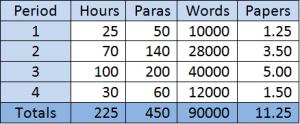(With apologies to Raymond Carver and Haruki Murakami)
Zvezdelina Stankova knows what she is talking about when she talks about triangles. Watch:
I think most people with a basic understanding of geometry will be able to follow this presentation. Even those who don’t will not get the impression that she is just making stuff up. She is clearly drawing from a very solid foundation of knowledge and saying things that she is both confident and passionate about. She is, as I sometimes like to put it, working from the center of her strength here. It is easy for her to support, elaborate and (if needed) defend these ideas.
Part of her confidence, I would point out, comes from her community of mathematicians. (There is strength in numbers, if you’ll pardon the pun.) She is not saying something that she is afraid she’ll be called out for by her peers. There is not a hint of insecurity or paranoia. But, while this sense that her statements are uncontroversial is important, it is by no means necessary. All that is required for her to know what she is talking about is that she is aware of anything that might be controversial. It is when people assert as certain something that is in question among professionals, or call into question something that is beyond doubt among professionals, that they get onto thin ice. Dr. Stankova is clearly standing on a glacier.
In fact, the video you just watched is just the tip of the iceberg. (Let’s not quibble about the mixed metaphor, but do please remember where icebergs come from.) It has been edited down from a longer session, some of which can be seen here:
Here, too, notice that while you may at times have difficulty keeping up with her proof, you at no point get the sense that she’s just pulling these things out of a hat. Even her drawing skills reveal her as someone who has drawn many triangles. She is good at it. She’s been dealing with triangles her whole life, it seems. She’s familiar with them.
When thinking about your own knowledge try to imagine explaining it under these conditions. Can you speak knowledgeably for five or ten minutes about subjects within your area of expertise? Do you know what you are talking about? What subjects can you talk about from the center of your epistemic strength like this? It’s worth making a list of truths you master at this level.
